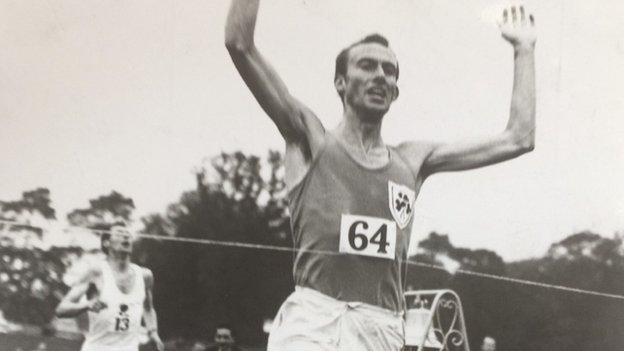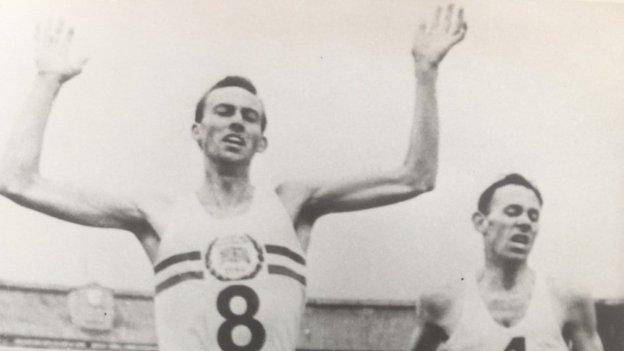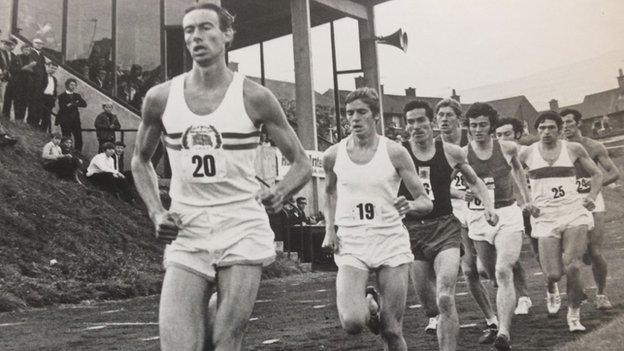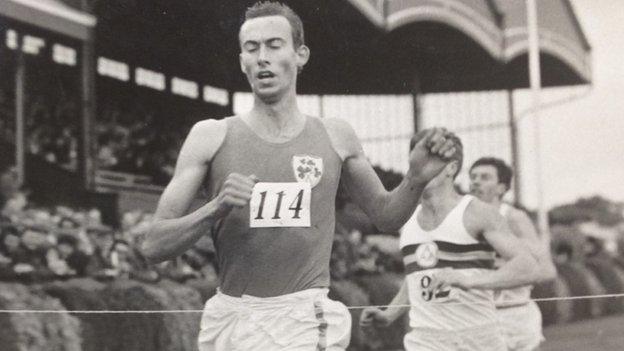Derek Graham won medal for Ireland in 1966 but soon was banned from racing south of the border
- Published

Derek Graham celebrated many victories wearing the Irish vest before being banned from racing south of the border in 1967
"In Dublin, they were happy to see the Irish vest winning races particularly against the English. The atmosphere was great. To have all that taken away from me in 1967….it was terrible. That was the beginning of the end for me anyway…whatever about the virus I got in 1970."
Derek Graham, possibly the greatest Irish track and field athlete many of you have never heard of, is on the phone from his Belfast home relating a story which is gobsmacking in its injustice.
With health woes which originated from a virus he picked up at the Commonwealth Games in Edinburgh 50 years ago, the 78-year-old isn't allowed outside his front door during lockdown.
The tale he tells makes you want to deliver him some kind of virtual hug.
On 20 March 1966, a 24-year-old Graham clinched Ireland's first International Cross Country Championship men's medal in 35 years when he won individual silver in Rabat.
The International Cross Country Championship was the global championship of its day through the muck and over the hills before the event changed its name to the World Cross Country in 1973.
But incredibly within little more than a year, Graham's days of pulling on the Irish vest and even competing in Dublin were over following a decision by the new Irish athletics governing body - bar one final outing in August 1967 when he represented a Great Britain team in the Civil Service Meet on the pristine grass track at Trinity College.
Irish records airbrushed from history
To make matters even worse, Graham, a six-time Irish senior champion, also had national records over two miles, three miles and 5,000m airbrushed from Irish athletics history.
"Ben Assou El Ghazi, who beat me for gold by seven seconds, was given six months leave from the army to train for the International Cross Country which was in his home city," recalls Graham of his outstanding Rabat run, when those behind him included fifth-placed then world mile record holder French star Michel Jazy.
"El Ghazi was a steeplechaser and they had these steeplechase barriers all through the course.
"I would lead into the barrier, virtually climb over it and this guy would come away with a 10-yard gap because he would just skim over it. That was happening five times a lap. The next week I beat him in a cross country event in Brussels on a proper muddy course."
But the magnificent performance in Morocco gave the Belfast man a huge boost in morale after a disappointing Tokyo Olympics two years earlier when shin splints caused by an unwise change of footwear shortly before the Games led to his early exit in the 5,000m.

Graham (left) ran for Great Britain at the 1964 Olympics and 1966 European Championships
Represented Great Britain in 1964 Olympics
Graham competed for Great Britain in Tokyo but the athletics conventions of the day allowed him to represent Ireland at the International Cross Country Championship and other meetings as he set a series of Irish records in the process of establishing domestic superiority over the likes of Tom O'Riordan and Jim McNamara.
"Running for Britain might appear a bit of a mystery but in those days all the athletics that was on the television was from London," adds the Belfast man, whose domination of Northern Ireland competition saw him go unbeaten for a decade.
"It was getting a fair amount of coverage with international matches such as Great Britain v USA, v Spain or Germany or whoever. My wee aspiration was getting into that. Then when you make your mark, that's the way you go.
"But I thoroughly enjoyed the competition for Ireland. I wore the Irish vest many times when I didn't have to. When I would go over to England to run, I would wear the Irish vest."
Just over four months after his Rabat heroics, Graham broke the four-minute mile barrier for the first time when finishing fifth in the Commonwealth Games final in Kingston, Jamaica won by legendary Kenyan Kip Keino.
But by the following summer, Graham was a victim of a ruling by the newly constituted Irish athletics governing body Bord Luthchleas na hEireann (BLE), which forbade athletes affiliated to the Northern Ireland Amateur Athletic Federation (NIAAF) from competing south of the border as the splits which bedevilled the sport's history on the island again surfaced.
Tom Hunt's 'Little Book of Irish Athletics' says BLE's decision was "designed to isolate the NIAAF….until agreement was reached on a 'free zone' for athletics in Northern Ireland which would allow athletes to compete for Great Britain or the Republic of Ireland depending on their nationality or allegiance".
'Santry was just heaven to me'
But whatever the intention, the result was that athletes such as Graham and legendary Ballymena-based Kilkenny woman Maeve Kyle were among Northern Ireland affiliated performers who could not compete south of the border until the ban was finally dispensed with in 1972.
"I got more support in Dublin than I got up here. And I had won the International Cross Country medal for Ireland and that's what made the 1967 decision so ridiculous," recalls Graham.
After Herb Elliott's Santry heroics in 1958, as he smashed the world mile record and pulled four other men including Ireland's Olympic champion Ronnie Delany under the four-minute barrier, the north Dublin cinder track attracted the globe's foremost middle distance runners and Graham found the lure irresistible.
"I just loved Santry. I had so many wins there. It was just heaven to me."
After managing to breach the newly-imposed southern ban in August 1967 as part of a British team, he earned a fifth straight win at the Civil Service meeting at College Park, Graham attempted a repeat performance the following summer at Santry as he chased an Olympic qualifying time for the Mexico Games.
"There was an international 5,000m race I went down for. I had already warmed up for it and it was going to be absolutely ideal for me but a matter of minutes before the race, the officials told me they wouldn't allow me on the track."

Graham (left) missed out on selection for the 1968 Olympics after being prevented from running in a major qualifying opportunity at Santry
Edged out of Mexico spot after Santry ban
Desperately needing the qualifying standard, Graham headed over to White City in London days later and while he ran a lifetime best and what should have been classified as an Irish record of 13:41.6, he was outkicked by Allan Rushmer and Alan Blinston in the final straight as he finished third.
"We were all within a second but I missed out on Olympic selection behind Rushmer and Blinston. They brought in Dick Taylor who didn't run in the race whose time was slower. He had a qualifying time and decided it was better to avoid that race.
"In that race, six people qualified for the Olympics including athletes from Canada and Australia and they all got to Mexico except me."
In addition to that 5,000m time, the Belfast man also set a series of Irish two and three-mile records between 1964 and 1967 which were all expunged from Irish athletics history following BLE's formation and have remained unlisted since Athletics Ireland became the national governing body in 1999.
Arguably, his most noteworthy performance against the clock came in May 1970 when he produced an astonishing half marathon time of 63 minutes and 53 seconds which remained a world best time until finally bettered in 1976.
Half Marathon heroics but then hit by virus
Graham's half marathon performance suggested he was bang in form going into the Commonwealth Games three months later only for him to be struck by a virus in Edinburgh which caused huge damage to his immune system - the legacy of which remains to this day.
"I ran against doctor's advice in the 5,000m final and the result of it was that I wrecked my immune system. I don't know what the virus was but they classed it at the time as ME," recalls Derek, who earlier in the Games had set a Northern Ireland 10,000m record despite suffering badly in the closing stages of 25-lap race.
"All the guys in the 5,000m final - bar Keino and Ron Clarke - I'd beaten and I really did want to go in there and give it my best shot.
"But whatever the virus was, the fact that I put myself under that pressure, it just ruined me. 1970 finished me."
Graham did compete sporadically as a veteran athlete - when he still won regularly despite his ill-health - but maltreatment by officialdom had caused him to fall out of love with the sport.
"There was a time for 20 years the word 'athletics' was never mentioned in the house," he admits.
In 2017, persistence from local athletics enthusiast Colin Beattie saw Graham attend the unveiling of a plaque to mark the 50th anniversary of the day he raced against Keino at Paisley Park in Belfast, when the two men produced the first sub four-minute miles in Northern Ireland.
After that belated recognition, the current unprecedented period of lockdown - amid the arrival of Facebook pages documenting long-forgotten Irish athletics performances as well as unsavoury episodes - has led to an increasing awareness of Graham's greatness.
The man himself continues to play down his achievements but others beg to differ including current Northern Ireland 5,000m record holder Dermot Donnelly, who simply describes Graham as the best distance runner ever produced by the province.

Derek Graham set a succession of Irish records before the formation of BLE saw his times being erased from the record books
Moves afoot to reinstate Graham's Irish records
When the recently set up Irish Athletics History Facebook page recalled the southern ban on Northern Ireland athletes, it was news to many of us and following much comment from shocked modern-day athletics fans, Graham made a rare public comment making abundantly clear the "heartbreak" it had caused him.
More than half a century on from the injustice, Derek insists that he is not seeking any redress - let's face it, none is possible - but moves are afoot within Athletics Ireland circles to have the national marks he set given their rightful place in the timeline of Irish records.
"At my age, I'm not really all that bothered now. And I don't want to turn it into some north v south thing because the Northern Ireland officials were not much better.
"Whenever I got picked for an international event a Northern Ireland official would have to accompany me for some reason, which wasn't the case with athletes from other countries.
"And even a few years ago, Northern Ireland Athletics were sent an invitation from people in Donegal who wanted me to be inducted into the Ulster Athletics Council's hall of fame in the county, but the invite was never passed on to me.
"A year later Bernie O'Callaghan phoned me from Donegal and asked if I would reconsider after turning down the invitation. I had no idea what they were talking about but ended up going there and was honoured to get the award."
At this moment, Derek's primary focus is on avoiding catching the coronavirus.
"I have no immunity whatsoever to this virus. And the doctor's letter says that if I get any of the symptoms at all, I am a hospital case.
"I haven't had any flu this winter but anything I get it goes into my chest and it would maybe be four weeks before I could breathe normally again. That's exactly what this virus would do."